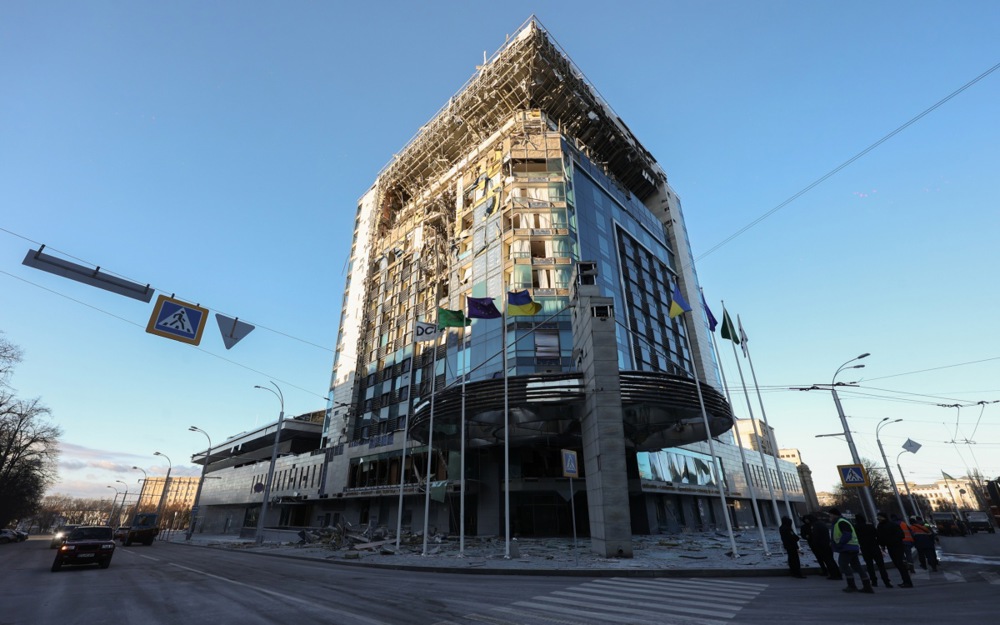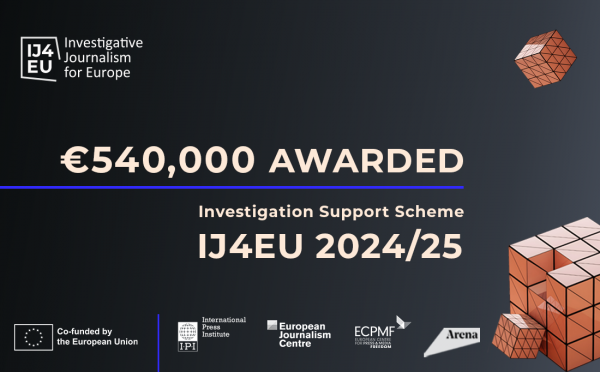The IPI global network firmly condemns apparent efforts by Russia’s military to step up attacks on hotels and other civilian infrastructure popular among journalists working in Ukraine.
In just over a week, two such hotels were destroyed in the eastern city of Kharkiv, leaving multiple journalists wounded and leading other correspondents to end their reporting trips ahead of schedule.
On December 30, a Russian missile struck Kharkiv Palace hotel, which is located in the center of the city. Two media workers were wounded in the attack: Svitlana Dolbysheva, a Ukrainian translator and producer working for the German TV channel ZDF, who suffered various injuries, including fractured vertebrae and a bruised lung; as well as a British national working for the channel as a security guard, who asked to remain anonymous, and who was operated on at a local hospital before being released. The remaining members of the ZDF reporting team were not harmed in the incident.
On January 10, Russian forces carried out a new missile strike on Kharkiv, this time targeting Park Hotel, located close to the city center. At the time of the incident, the hotel accommodated several international correspondents, including a team working for France TV, as well as journalists with Anadolu Agency, Turkey’s national news agency.
As a result of the attack, three journalists required treatment by medical services: Violetta-Anastasia Pedorych, a Ukrainian producer for France TV; Anadolu Agency reporter Davit Kachkachishvili, who sustained minor cuts on his hand; and Anadolu photojournalist Özge Elif Kizil, who was transported to a local hospital as a precautionary measure, along with the two other journalists.
“Russia must stop targeting journalists, who are civilians and therefore never legitimate targets in war”, IPI Deputy Director Scott Griffen said. “We vehemently condemn the targeting of hotels and other locations frequented by journalists. Russia’s attacks on the media in Ukraine must be investigated by relevant authorities as potential war crimes under international humanitarian law.”
According to Ukrainian authorities, Park Hotel was known to be popular among foreign journalists:
“Military personnel never lived in this hotel, almost all of Kharkiv knows this,” Volodymyr Tymoshko, the head of police of Kharkiv region, told Ukraine’s public broadcaster Suspilne. “[It] was used by journalists. This was a well-known fact. At the time of the attack, foreign correspondents, in particular from Turkey, were staying in the hotel. Therefore, I believe that the Russian Federation carried out this attack precisely on mass media.”
Russian authorities have refused to acknowledge that the attacks on December 30 and January 10 attacks in Kharkiv produced civilian casualties, with the country’s Ministry of Defence claiming to have exclusively targeted strategic and military infrastructure in the city.
The Russian Ministry of Defence alleged that in firing missiles on Kharkiv Palace Hotel, Russia’s military aimed to liquidate Ukrainian military personnel. The hotel’s management, on the other hand, said that out of the 15 rooms rented out in the complex, ten were occupied by journalists.
As for the attack on January 10, the Russian Ministry of Defence did not comment on the incident, failing to mention it in its daily update on the military’s activities in Ukraine.
The recent attacks in Kharkiv echo earlier Russian missile strikes throughout 2023: in June, Ukrainian writer Victoria Amelina was killed, along with 12 other people, in an attack targeting a restaurant in the city of Kramatorsk (Donetsk region), known to be popular among journalists and aid workers, alongside military personnel. Journalists Anastasia Taylor-Lind and Catalina Gómez Ángel were wounded in the attack.
A similar incident occurred on August 7 in the city of Pokrovsk, also in Donetsk region. While no journalists were wounded at the time, press freedom and other groups condemned the strikes as consciously targeting rescue workers and journalists. Russian forces carried out two strikes in the space of 40 minutes, targeting the same area and leading to a high number of casualties among police and rescue workers who had earlier arrived at the scene.
IPI denounced the attack in a common statement with 23 other organizations, as “deliberately targeting journalists by employing a ‘double tap’ strategy to kill rescue workers and media personnel responding to the initial shelling”, with the intent to cause mass civilian and media casualties.



